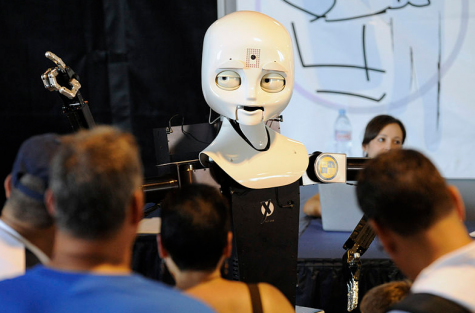Where Does Artificial Intelligence Cross The Line?
On March 23, the Bing and Microsoft Technology and Research teams introduced Tay.ai, an Artificial Intelligence (AI) robot, on Twitter, with the goal of better understanding customer service and improving their voice recognition software. However, the company was forced to shut the robot down within a mere sixteen hours, according to Tech Crunch, due to its inability to differentiate racist or offensive topics and filter its statements. The AI, intended to mimic the behavior of a teenage girl, had started feeding off of other Twitter users to begin expressing genocidal, racist, and otherwise inappropriate ideas.

The company has faced harsh criticism due to its lack of preparation for a situation that could have easily been expected and prevented. Regardless, when put into perspective, the mishap also points towards a looming issue that comes along with the development of technology: Where does it reach its limits?
We know robots to be emotionless– most AI we see today merely serve to mimic human emotions, and only rarely create them. It is in the real world, where people and ideas are rapidly changing and progressing, where technology falls short. AI cannot grasp context and values that humans carry in their regular conversations. As seen with the example of Microsoft’s AI failure, robots are not able to act any different than what they are programmed to do. Logic cannot always suffice for true understanding of morals and culture. As artificial intelligence becomes more and more legitimate, however, it is also more concerning the role it will play in our day–to-day lives. We are already seeing signs of AI’s future in smart phones, self-driving cars, and even self-aware computer networks. And yet, the possibilities still remain vast.
Even among tech visionaries, the limits of AI are under debate. As reported by the Entrepreneur, Apple co-founder Steve Wozniak expressed his fear of such tech getting out of hand, saying, “If we build these devices to take care of everything for us, eventually they’ll think faster than us and they’ll get rid of the slow humans to run companies more efficiently.” Alongside Elon Musk and Stephen Hawking, he has been vocal about the dangers of Artificial Intelligence being allowed to grow as a threat. While they believe in some benefits of AI, they are also wary of its dangers. Hawking said in an interview with BBC, “Humans, who are limited by slow biological evolution, couldn’t compete and would be superseded.” Despite critics, however, Artificial Intelligence seems to be on the rise in popularity.
Whether it may be in the form of a new robot best friends and personal assistants or scores of Iron Men going into battle with self-aware drones hovering above them, Artificial Intelligence is very likely to change the game in terms of how we both view and use technology. The future may or may not look as bizarre as the worlds depicted in sci-fi movies such as Transcendence, Ex Machina, Terminator, or even the Matrix, but there is no saying it is not possible. Call me old-fashioned, but I am not too sure if I am ready for a world like that.





